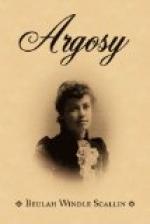I grew troubled, these nocturnal visits continuing, and wished that I could help her. I thought if I could only find out whose the photograph was, perhaps I might.
One night I could bear it no longer. I am aware that I must seem a most prying old woman; but somehow or other this library was fated to be mixed up with my life. I rose and just peeped round the library door to see what she was doing. She was standing in the clear moonlight—not, as I had expected, with an open photograph album, but holding a little miniature, taken from its place on the table. I went back to bed, my heart bounding. I knew now! I did not sleep much that night.
Perhaps I acted rashly—but I thought I should apply to Paul for help. I was sure, from various signs, that he did not hate my Janet’s bairn now. I told him of these stolen visits to the library, and tried to persuade him to conceal himself and watch there—for the purpose of finding out whose the portrait was. I did not tell him, deceitful woman that I was, that I myself already knew. Old people like him and me, I said, should help the child out of her trouble. I must have startled him terribly: he grew, at first, so white. Then he looked at me long and intently; and by-and-by began to cross-examine me. We were canny Scots, both of us, and fenced.
“You say it was a photograph you saw her with?”
“I did not say I saw her.”
“You have heard her open an album?”
“I have heard her move books.”
I have seen the time when I could have broken a lance with the best; but I was growing old, and he finished by getting me into rather a hobble—when he abruptly left me, a great flush sweeping over his face. He came back by-and-by, and took me out into the garden. If he never had been the real old Paul before—he was so now. He cut the pansies from my best cap, and decorated Duncan’s coat-of-arms—which had broken out about the walls now-a-days—with them. But he might have cut the cap in two for all I cared just then.
That night—I hoped he had not forgotten—I hoped he would come. Presently I heard a quiet step which I knew to be his. Then I sat down and listened again. Swish, swish—here she was at last. I had listened too often to the soft rustle of her trailing gown to make any mistake now. In my excitement—you see I was an old habitue at prying and peering about the library by this time—I put one eye round the door, at her very back. She had gone a few steps into the room—and now stood, rooted to the spot, startled. There, with his face—and all that he would have it say—fair and bright in the moonlight, stood Paul. He opened his arms.
“Janet,” he said.
With a little cry, and a sob, the girl rushed into them.




